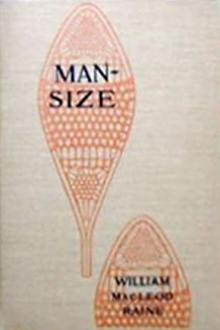Laughing Bill Hyde and Other Stories by Rex Beach (ebook smartphone .TXT) 📗

- Author: Rex Beach
Book online «Laughing Bill Hyde and Other Stories by Rex Beach (ebook smartphone .TXT) 📗». Author Rex Beach
He began again, this time laboriously eliminating himself, and when he had finished his story it was perhaps the poorest journalistic effort ever written.
Upon lagging feet he bore the copy to Burns's office. But the editor gave him no time for explanation, demanding, fiercely:
"Where's that check I sent you?"
"Here it is." The youth handed it to him. "Make a mistake?"
"I certainly did." Burns tore up the check before saying, "Now you get out, you bum, and stay out, or take the consequences."
"Get out? What for?"
"You know what for." Burns was quivering with rage. "You ran a good bluff and you nearly put it over; but I don't want to advertise myself as a jackass, so I shan't have you pinched unless you come back."
"Come back? I intend to stay. What's the matter?"
"I had an idea you were fourflushing," stormed the editor, "so I went down to the G.T. depot myself. There's no trunk of the sort there; Corrigan never saw you or anybody like you. Say, why didn't you walk out when you got that check? What made you come back?"
Anderson began to laugh softly. "Good old Corrigan! He's all right, isn't he? Well, he gets half of that check when you rewrite it, if I don't laugh myself to death before I get to the bank."
"What d'you mean?" Burns was impressed by the other's confidence.
"Nothing, except that I've found one square man in this village. One square guy is a pretty big percentage in a town the size of Buffalo. Corrigan wouldn't let you see the depot if I wasn't along. Put on your coat and come with me—yes, and bring a couple of hired men if it will make you feel any better."
At the depot he called the baggage-master to him, and said:
"Mr. Corrigan, this is Mr. Burns, the city editor of The
Intelligencer."
"That's what he told me," grinned the Irishman, utterly ignoring the young editor; "but you didn't give him no references, and I wouldn't take a chance."
Burns maintained a dignified silence; he said little even when the contents of the trunk were displayed to him. Nor did he open his mouth on the way back to the office. But when he was seated at his desk and had read Anderson's copy he spoke.
"This is the rottenest story ever turned in at this office," said he.
"I know it is," Paul agreed, frankly, then explained his difficulty in writing it.
"I'll do it myself," Burns told him. "Now, you go home and report to-morrow."
A very tired but a very happy young man routed out the landlady of a cheap boarding-house that night and hugged her like a bear, explaining joyously that he had done a great big thing. He waltzed her down the hall and back, while she clutched wildly at her flapping flannel wrapper and besought him to think of her other boarders. He waltzed her out of her bedroom slippers, gave her a smacking big kiss on her wrinkled cheek, then left her, breathless and scandalized, but all aflutter.
The city had read the story when Anderson awoke the next morning, for The Intelligencer had made a clean "beat," and Burns had played up the story tremendously, hence it was with jumping pulses that Paul scanned the front page of that journal. The further he read, however, the greater grew his indignation.
The history of Mabel Wilkes, under the magic touch of Burns, had, to be sure, become a wonderful, tragic story; but nowhere in it was mention made of Paul Anderson. In the patient and ingenious solution of the mystery of the girl's identity no credit was given to him. The cleverness and the perseverance of The Buffalo Intelligencer was exploited, its able reportorial staff was praised, its editorial shrewdness extolled, but that was all. When he had concluded reading the article Anderson realized that it was no more than a boost for the city editor, who it was plain to be seen, had uncovered the story bit by bit, greatly to the confusion of the police and the detective bureau.
It astounded as well as angered Paul to realize how cleverly Burns had covered him up, therefore the sense of injustice was strong in him when he entered the office. His enemy recognized his mood, and seemed to gloat over it.
"That was good work you did," he purred, "and I'll keep you on as long as you show ability. Of course you can't write yet, so I'll let you cover real-estate transactions and the market. I'll send for you when you're needed."
Anderson went back to his desk in silent rage. Real estate! Burns evidently intended to hold him down. His gloomy meditations were somewhat lightened by the congratulations of his fellow-reporters, who rather timidly ventured to introduce themselves. They understood the facts and they voiced a similar indignation to his. Burns had played him a rotten trick, they agreed. Not content with robbing his new reporter of the recognition which was justly his, the fellow was evidently determined to vent his spite in other ways. Well, that was like Burns. They voiced the opinion that Anderson would have a tough job getting through interference of the kind that their editor would throw in his way.
Hour after hour Paul sat around the office nursing his disappointment, waiting for Burns to send him out. About two o'clock Wells hurried into the office, bringing with him the afternoon papers still wet from the press. In his eyes was an unwonted sparkle. He crossed directly to Anderson and thrust out his palm.
"Old man, I want to shake with you," said he. "And I want to apologize for being a rotter."
Paul met him half-way, and the fellow went on:
"Burns gave us the wrong tip on you—said you were a joke—that's why we joshed you. But you showed us up, and I'm glad you did."
"Why—thank you!" stammered the new reporter, upon whom this manly apology had a strong effect. "It—it was more luck than anything."
"Luck nothing! You're a genius, and it's a dirty shame the way the boss tried to steal your credit. However, it seems he overreached himself." Wells began to laugh.
"Tried to steal it! Good Lord! he did steal it! How do you mean he overreached himself?"
"Haven't you seen the afternoon papers?"
"No."
"Well! Read 'em!" Mr. Wells spread his papers out before Paul, whose astonished eyes took in for a second time the story of the Wilkes suicide. But what a story!
He read his own name in big, black type; he read head-lines that told of a starving boy sent out on a hopeless assignment as a cruel joke; he read the story as it had really occurred, only told in the third person by an author who was neither ashamed nor afraid to give credit where it was due. The egotistical pretense of The Buffalo Intelligencer was torn to shreds, and ridicule was heaped upon its editor. Paul read nervously, breathlessly, until Wells interrupted him.
"I'm to blame for this," said he. "I couldn't stand for such a crooked deal. When I got in this morning and saw what that fat imbecile had done to you I tipped the true facts off to the others—all of the facts I knew. They got the rest from Corrigan, down at the Grand Trunk depot. Of course this means my job, if the old man finds it out; but I don't give a damn."
As yet Anderson was too dazed to grasp what had happened to him, but the other continued:
"The boys have had it in for Burns, on the quiet, for months, and now
I guess they're even."
"I—I don't know how to thank you," stammered Anderson.
"Don't try. You're a born reporter, and the other papers will give you a job even if the baby hippo in yonder fires you."
A boy touched Paul on the arm with the announcement, "Mr. Burns wants to see you."
"Oho!" cried Wells. "He's got the bad news. Gee! I'd like to hear what he says. I'll bet he's biting splinters out of his desk. Let me know what comes off, will you?"
When Anderson entered the office of his editor he was met by a white-faced man whose rage had him so by the throat that speech for a moment was impossible. Beneath Mr. Burns's feet, and strewn broadcast about the room, were the crumpled sheets of the afternoon papers. Burns glared at the newcomer for a moment, then he extended a shaking finger, crying, furiously:
"You did this!"
"Did what?"
"You put up this job. You made a fool of me!"
"No, sir! I did not. Your parents saw to that."
"Don't tell me you didn't, you—you damned ungrateful—" Burns seemed about to assault his reporter, but restrained himself. "You're fired! Do you understand? Fired—discharged."
"Say, Burns—"
"Not a word. I'm done with you. I—"
"Just a minute," young Anderson cried, in a tone that stilled the other. "I'm fired, am I, for something I didn't do? Very well! I'm glad of it, for now you can't stand in my way. You tried to double-cross me and failed. You robbed me of what was mine and got caught at it. You're a big man, in your way, Burns, but some day people will tell you that the biggest thing you ever did was to fire Paul Anderson. That's how small you'll be, and that's how big I'm going to grow. You've 'welched' on your own word; but there's one thing you gave me that you can't take away, and that's the knowledge that I'm a newspaper man and a good one. Now just one thing more: I'm broke today, but I'm going to lick you as soon as I save up enough for the fine."
With studied insolence the speaker put on his hat, slammed the door behind him, and walked out of The Intelligencer office, leaving the apoplectic editor thereof secure in the breathless knowledge that for once in his life he had heard the truth spoken. Mr. Burns wondered how long it would take that young bully to save up ten dollars and costs.
OUT OF THE NIGHT"There is but one remedy for your complaint." Doctor Suydam settled deeper into his chair. "Marry the girl."
"That is the only piece of your professional advice I ever cared to follow. But how?"
"Any way you can—use force if necessary—only marry her. Otherwise I predict all sorts of complications for you—melancholia, brain-fag, bankruptcy—"
Austin laughed. "Could you write me a prescription?"
"Oh, she'll have you, Bob. You don't seem to realize that you are a good catch."
Austin finished buckling his puttee before rising to his full height.
"That doesn't mean anything to her. She doesn't need to make a catch."
"Nonsense! She's just like all the others, only richer and nicer. Go at her as if she were the corn-market; she won't be half so hard to corner. You have made a name for yourself, and a blamed sight more money than you deserve; you are young—comparatively, I mean."
The elder man stroked his shock of iron-gray hair for answer.
"Well, at any rate you are a picturesque personage, even if you can't wear riding-clothes."
"Doesn't a man look like the devil in these togs?" Austin posed awkwardly in front of a mirror.
"There's only one person who can look worse in riding-clothes than a man—that's a woman."
"What heresy, particularly in a society doctor! But I agree with you. I learned to ride on her account, you know. As a matter of fact, I hate it. The sight of a horse fills me with terror."
Doctor Suydam laughed outright at this. "She tells me that you have a very good seat."
"Really!" Austin's eyes gleamed suddenly. "You know I never had a chance to ride when I was a youngster—in fact, I never had an opportunity to do anything except work. That's what makes me so crude and awkward. What I know I have picked up during the last few years."
"You make me tired!" declared the former. "You aren't—"
"Oh, I don't skate on waxed floors nor spill tea, nor clutch at my chauffeur in a tight place, but you know what I mean. I feel lonesome in a dress-suit, a butler fills me with gloom, and—Well, I'm not





Comments (0)